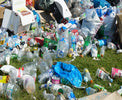
A New National Strategy to Tackle Plastic Pollution in the U.S.
, by Planet Green, 4 min reading time

, by Planet Green, 4 min reading time
Plastic pollution has become one of the most pressing environmental challenges globally. The World Bank estimates that each person generates an average of 1.6 pounds (0.74 kilograms) of plastic waste every day, contributing to a growing problem that impacts ecosystems, wildlife, and human health.
Recognizing the urgent need for action, 175 nations are currently negotiating a binding international treaty (https://www.un.org/en/climatechange/nations-agree-end-plastic-pollution) aimed at curbing plastic pollution, with a target completion date of late 2024. In alignment with these global efforts, the Biden administration has released the first-ever national strategy for reducing plastic pollution in the United States, setting the stage for significant policy shifts and innovations.
Five Pillars of the U.S. Strategy
The U.S. strategy addresses plastic pollution across five key areas: plastic production, product design, waste generation, waste management, and the capture and removal of plastic waste. These focus areas outline actions that federal agencies and departments will take to reduce plastic waste and promote sustainability.
Microplastics, tiny plastic fragments found in environments ranging from the atmosphere to food chains, present a significant challenge. While their impact on wildlife, such as seabirds, is well-documented, the effects on human health remain less clear. A major hurdle has been the lack of standardized methods for measuring microplastics across different media, such as water, soil, and air.
To address this, the Biden administration’s plan includes the development of standardized methods for collecting, quantifying, and characterizing microplastics and nanoplastics. This initiative will enable scientists to produce consistent data, paving the way for regulators to set limits on microplastics in food, water, and air, thereby protecting public health and the environment.
The vast majority of plastics contain chemicals that enhance properties like strength, flexibility, and durability. However, some of these chemicals, such as bisphenol and phthalates, are associated with serious health risks, including reproductive health issues and cancer.
Extended producer responsibility (EPR) laws, already in place for products like paint and electronics, could also be applied to plastic waste. These laws would hold producers accountable for the collection and disposal of their products or require them to contribute to the costs of managing plastic waste. The Biden administration supports launching a national EPR initiative, which would encourage more states to adopt such laws, leading to higher recycling rates and more sustainable product design.
Consumable single-use plastics, such as shopping bags, food wrappers, and bottles, and printer cartridges are among the most prevalent pollutants in the environment. To combat this, the U.S. strategy includes plans to phase out the federal government’s purchase and use of single-use plastic items by 2035.
In addition to these government-led efforts, the importation of consumable single-use plastic products, particularly single-use ink cartridges through major retail platforms like Amazon, has exacerbated the plastic waste crisis. Unlike remanufactured OEM ink cartridges, which companies like Planet Green Recycle create to extend their lifecycle, single-use ink cartridges imported from countries like China are not subject to remanufacturing. As a result, they often go straight into landfills, contributing significantly to the growing plastic waste problem in the U.S.
By not supporting remanufacturing and the sale of recycled products, major online retailers are inadvertently increasing the flow of plastic waste. To truly tackle the plastic pollution crisis, the U.S. must promote the remanufacturing industry and take steps to reduce the import of single-use plastic products that are not designed for recyclability.
Global plastic production is projected to double by 2040, exacerbating the already critical issue of plastic waste. In response, 66 countries have joined the High Ambition Coalition, advocating for strict measures in the global plastics treaty, including capping plastic production.
While the U.S. initially hesitated to endorse a production cap, recent reports suggest a shift in policy. The Biden administration is now expected to support limits on plastic production and advocate for the creation of a global list of restricted chemicals. This change could significantly influence global negotiations and increase the likelihood of successfully capping plastic production.
The Need for Comprehensive Action
The U.S. national strategy to reduce plastic pollution marks a critical step forward in addressing one of the most pervasive environmental issues of our time. By focusing on microplastics, extended producer responsibility, single-use plastics, and production limits, the strategy lays the groundwork for meaningful change. However, ongoing efforts at both national and international levels will be necessary to ensure that these policies are implemented effectively and that the momentum for reducing plastic waste continues to grow.

Pinellas County, Florida, has taken a significant step in combating plastic waste by adding Planet Green Recycle to its public-facing information website. Residents and businesses...

The Holiday Spirit Meets Sustainability The holiday season is a time for giving, celebrating, and creating memories. It’s also a time when we tend to...

With November 15th being celebrated as America Recycles Day, the Plastics Industry Association (PLASTICS) commemorates Recycling Week this year from November 11th through November 15th...

Plastic pollution has become one of the most pressing environmental issues of our time, impacting land, waterways, and marine life on a global scale. While...